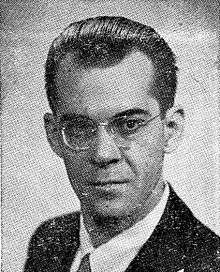Vincent Gaddis
Vincent Hayes Gaddis (December 28, 1913 – February 26, 1997) was an American author who invented the phrase "Bermuda Triangle", which he used first in the cover article for the 1964 February issue of the magazine Argosy.[1][2] He popularized many stories about anomalous and paranormal phenomena in a style similar to that of Charles Fort.[3]
Vincent Gaddis | |
|---|---|
 | |
| Born | Vincent Hayes Gaddis December 28, 1913 Ohio, U.S. |
| Died | February 26, 1997 (aged 83) |
| Occupation | Paranormal writer |
Career
Gaddis was born in Ohio to Tilden H. and Alice M. (Smith) Gaddis. He married Margaret Paine Rea on July 14, 1947. Gaddis worked as a newspaper reporter and writer-editor for a Warsaw, Indiana, radio station from 1947 to 1952. He was a feature writer for the Elkhart Truth, a daily newspaper in Elkhart, Indiana, from 1952 to 1959. He then worked as a public relations writer for Studebaker-Packard Corporation and Mercedes Benz Sales in South Bend, Indiana. In 1962 he became a freelance writer. He died in Eureka, California.[4]
Reception
Gaddis' statements on the Bermuda Triangle and spontaneous human combustion have been criticized by skeptics for being inaccurate and misleading. Gaddis has also drawn strong criticism for ignoring possible natural explanations and inventing mysteries where none exist.[5][6][7][8]
Historian William K. Powers from Livingston College, Rutgers University has described Gaddis' American Indian Myths and Mysteries as an "outrageous and intolerable book" filled with crackpot claims and "Danikenesque delusions".[9]
Published works
- Winona Lake: A Memory and A Vision, 1949
- Invisible Horizons: True Mysteries of the Sea, 1965
- Mysterious Fires and Lights, 1967
- Wide World of Magic, 1967
- Strange World of Animals and Pets, 1970
- The Curious World of Twins, 1972
- Courage in Crisis: Dramatic Tales of Heroism in the Face of Danger, 1973
- American Indian Myths and Mysteries, 1977, ISBN 0-88029-755-7
- Gold Rush Ghosts, 1990, ISBN 0-945685-06-8
See also
- Philadelphia Experiment
- Crawfordsville monster
- Raifuku Maru
References
- Vincent H. Gaddis (February 1964). "The Deadly Bermuda Triangle". Argosy.
- "The "Mystery" of the Bermuda Triangle". The Museum of Unnatural History.
- Williams, William F. (2000). Encyclopedia of Pseudoscience: From Alien Abductions to Zone Therapy. Routledge. p. 125. ISBN 1-57958-207-9
- Bradley, Nancy. "My Life with Paranormal Icon Vincent Gaddis". Haunted America Tours. Retrieved 8 May 2014.
- Nickell, Joe. (1996). Not-So-Spontaneous Human Combustion. Skeptical Inquirer. 20.6.
- Harrison, Guy P. (2012). Chapter 46: "Something Very Strange is Going on in the Bermuda Triangle". In 50 Popular Beliefs That People Think Are True. Prometheus Books. ISBN 978-1-61614-495-1
- Kusche, Larry. (2015). "The Bermuda Triangle Mystery Delusion: Looking Back after Forty Years". Skeptical Inquirer. Retrieved 12 November 2016.
- Nickell, Joe. (2016). "Creators of the Paranormal". Skeptical Inquirer. Retrieved 12 November 2016.
- Powers, William K. (1979). American Indian Myths and Mysteries by Vincent H. Gaddis. Journal of American Folklore 92 (366): 501-503.
External links
- "Electrical Ghosts," article by Gaddis in Borderland Sciences Journal, 1988
- "The Art of Honest Deception," article by Gaddis in Strange Magazine
- Gaddis family tree
- Fiction Mags Index, list of stories by Gaddis